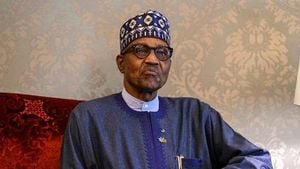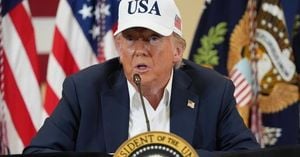In a significant escalation of tensions surrounding the ongoing conflict in Ukraine, U.S. Senator Lindsey Graham announced on May 1, 2025, that at least 72 senators are poised to support "bone-crushing" sanctions against Russia. This proposed legislation would impose hefty 500% tariffs on imports from nations purchasing Russian oil, natural gas, and uranium, should President Vladimir Putin fail to engage in serious peace negotiations to resolve the war. Graham emphasized that these sanctions reflect a strong bipartisan consensus in the Senate regarding Russia's role as the primary antagonist in the conflict.
Graham, a vocal advocate for military support to Ukraine and a close ally of former President Donald Trump, stated, "The goal is to help the president. I think Trump’s the best person to achieve that goal, but these sanctions represent the Senate's view that we see the primary bad guy as being Russia." He warned Putin against trying to manipulate the situation, asserting that these sanctions would serve as "a tool in President Trump's toolbox." This announcement coincides with heightened efforts by U.S. officials to broker a ceasefire in the ongoing war, which has seen a dramatic increase in violence recently.
On April 24, 2025, Russia launched a barrage of 215 missiles and drones across Ukraine, resulting in the tragic deaths of at least 12 civilians and injuring 87 others in Kyiv. In response to this aggression, Trump described the attack as "not necessary" and characterized the timing as "very bad," directly appealing to Putin with a plea: "Vladimir, Stop!" However, he did not specify any consequences for the Kremlin's actions.
In a move that many observers have viewed as a strategic ploy, Putin announced a symbolic "humanitarian" ceasefire from May 8 to May 11, coinciding with Russia's Victory Day celebrations. However, Ukrainian President Volodymyr Zelensky rejected this ceasefire on April 28, calling it "another attempt at manipulation" and reiterating Ukraine's demand for a full and unconditional 30-day ceasefire. Notably, Kyiv had previously accepted a truce proposed by Washington in March 2025, but Moscow has continued its offensive operations, disregarding the peace overtures.
On the same day as Graham's announcement, Russian drones carried out a deadly attack on the Ukrainian port city of Odesa, killing at least two people and injuring five others. According to Oleh Kiper, the regional leader of Odesa, the drone strikes caused significant damage to residential buildings, a supermarket, and a school. Kiper reported on Telegram, "Two people died and five others were injured as a result of the strike. Medics are providing all necessary assistance to the victims." The mayor of Odesa, Gennady Trukhanov, condemned the attack, stating, "The enemy has launched another massive attack on the city. Residential buildings and civilian infrastructure have been damaged in various areas of Odesa."
Despite the ongoing violence, the U.S. has been moving forward with plans to bolster Ukraine's defense capabilities. Recently, a deal was signed between the U.S. and Ukraine that focuses on the joint exploitation of Ukraine's energy and mineral resources. This agreement marks a notable shift in U.S. policy under Trump's administration, showcasing a deeper commitment to supporting Ukraine's economic recovery amidst the war.
In a related development, a Russia-appointed official reported later on May 1 that seven people had been killed in a Ukrainian drone attack in the occupied town of Oleshky. This official, Vladimir Saldo, claimed that a crowded market had been targeted. However, Ukrainian forces countered that their operation was aimed at a military target, resulting in the death of two Russian soldiers.
Additionally, reports emerged of a drone striking a petrol station in the center of Kharkiv, while explosions were also heard in the city of Sumy, indicating that the violence is far from contained. The situation remains fluid, with both sides engaging in aggressive military actions even as diplomatic efforts continue.
As the conflict rages on, the international community watches closely, hoping for a resolution that will bring an end to the suffering of civilians caught in the crossfire. The stark reality is that each day brings new challenges and tragedies, underscoring the urgent need for a sustainable peace agreement.
Looking ahead, the proposed sanctions and tariffs could significantly impact the global economy, particularly as countries grapple with the implications of their relationships with Russia. Graham's remarks signal a strong willingness among U.S. lawmakers to take decisive action against what they perceive as Russian aggression, but it remains to be seen how this will play out in the broader geopolitical landscape.
In the meantime, the humanitarian crisis in Ukraine continues to escalate, with millions displaced and in dire need of assistance. The international community's response will be crucial in shaping the future of Ukraine and the region.




